Not worth getting a tube tester for the purpose you describe unless you have a lot of time, money and patience or are just bored. I have one, but I’m a nerd.
Numbers are specific to each tube tester so to know what they mean you have to know what tube tester it was tested on and look up in the manual what the new and minumum numbers are.
Whoever you bought the tubes from should be able to explain the numbers to you.
Jerry
|
Jerry
good advice
thank you
|
Numbers are specific to each tube tester so to know what they mean you have to know what tube tester it was tested on and look up in the manual what the new and minumum numbers are.
Exactly.
|
Like a broken record, I keep on saying anyone with tube equipment should buy their own tube tester.
............................................................
most testers of that era used cheap hardware, thin vinyl, so don't let the beat up look concern you IF the seller says tested, works ....
those numbers you mentioned: "How do you read tubes that are marked :(I.e) 95/91 or 46/41"
are not tube identification numbers, there are markings on the tubes themselves, i.e. 12ax7; 12au7; 6sl7; kt88; el34; ...
pull them out, rotate them in the light until you can see the marking on the side of the glass.
they have key slots, or missing pin holes, so you cannot reinstall them incorrectly, BUT, make sure you know which socket they came from/go back into.
some chassis have the tube type printed next to the sockets, some print V1, V2 ....
then there is a reference page in the manual saying V1 is ... V2 is ...
.................................
Cary ought to be able to help you, and simply search the internet with your model number, a lot of info is out there.
|
@elliottbnewcombjr
Good point to get a tube tester, when:
.you have a lot of tubes, meaning selling, buying or your equipment uses many and requires frequent tube change. Yes in the long run it would be more economical too.
.have learnt a lot about your tubes or tubes in general and know what you want to measure.
.can maintain your tube tester, especially when vintage
.if you want to buy a tube tester, whether vintage or new, do not get a cheap one, a different research is needed for what kind of tube tester you need.
Otherwise a good and reputable vendor can mostly provide what is requested and with valid measurements.
|
My Opinion
ANYONE with tube equipment needs his own tester to have confidence in their tubes when problems/suspicions occur, when checking periodically, when checking/confirming new purchases, ’matched’ ....
You don’t need an expensive pro version to get simple and relative answers. Smaller, lighter, makes it easy to bring upstairs, take to a friend’s house .... that’s why I like the Accurate Models, 157, 257, I have both.
I have a big expensive heavy one, the little Accurate testers ALWAYS gave the same answers as the big one. It’s downstairs somewhere, I haven’t seen it in so long, I forget if it a Jackson or a Hickok
|
Agree with carlsbad…Unless you are buying and selling tubes or are bored and want to dig into tubes and tinker with testers just locate a repair shop that tests tubes or testing service like the one on the link below. I was considering buying one until I researched it and talked to experts. The affordable testers in good working order only tell you if a tube is good meeting the standard. If you buy a one that has the capability to measure GM, match etc. ,which are expensive, they have to maintained and calibrated regularly.
Tube testing service example: https://www.western-glow.com/vaccum-tube-testing-matching/
|
@carlsbad
+1
I am not in the geek camp. I have all tube gear. My equipment has tube time counters. Even if they didn’t it isn’t that hard to generally estimate the tube time. I have about 40 tubes in my system. I have swapped 3 tubes in the last 3,000 hours of play… they are recommended to be replaces every 2,000 hours.
I just buy tube sets either from the equipment manufacturer or Upscale or the Tube Company. I keep an extra set for each unit. If you get a whistle or strange effect. Swap to new tube set a couple at a time to ID bad tube. This has only happened to me twice in ten years. Really simple.
|
I'll add that you can get a lot of info about a tube from your amp, especially is it has manual bias adjust. Not everything, but a lot.
you have to understand the electronics though.
Jerry
|
Like a broken record, I keep on saying anyone with tube equipment should buy their own tube tester.
I had a nice 666 Eico tester. I didn't use it much. I buy new production tubes from very reliable sources and I have only had one issue with a noisy preamp tube. The tube tester doesn't insure quiet tubes because it's the function of the preamp circuit that determines that. Listening is the only way sometimes. I've also blown power tubes, that is spectacular and no measurements are needed, the whole tube bank gets replaced at that point. Bottom line...I have no tester and really not missing it.
|
"95/91 or 46/41" If these numbers are written on the side of a tube with a Sharpie they are the test results of a 2 section tube. Unfortunately they are meaningless unless the tube tester is known along with the results chart. Now generally 95/91 is generally a good reading, however 46/41 is not. Take this with a grain of salt as the tube tester is unknown. Always buy tubes, especially ones that need matching from a reputable vender. A Google search will give you a start.
|
Check craigslist, they typically aren't too much money there and they almost always seem to have. Years ago, every hardware and drugstore had one. You'd take your tubes in a grocery bag and plug away. I do not have one. I listen and if something is off, I swap the whole set for said device. If you test and find a bad one, a new one will not match up with the old ones.
|
I bought a tube tester when I started playing with DHT and rectifiers. Having one actually saved my new amp from a shorted rectifier. It was a NOS 5r4gy from 1956 that I bought as a group of 4. They were time capsule condition yet one was bad
Your best bet is to pay a few bucks extra to have pairs and quads matched. Also a good idea to have dual triodes matched and screened for noise. My best quality tube sets have been purchased from trusted sources that match. This was proven after testing a bunch of tubes collected over the years
When I receive them I also test them.
I was lucky, I bought a mint Hickok that works great and is accurate with several "bogey" tubes so it's more than accurate for weeding out bad tubes and matching good ones. MOST TUBE TESTERS NEED WORK. Always remember that if thinking of getting one.
Almost all of my gear has tubes so for me it is peace of mind. 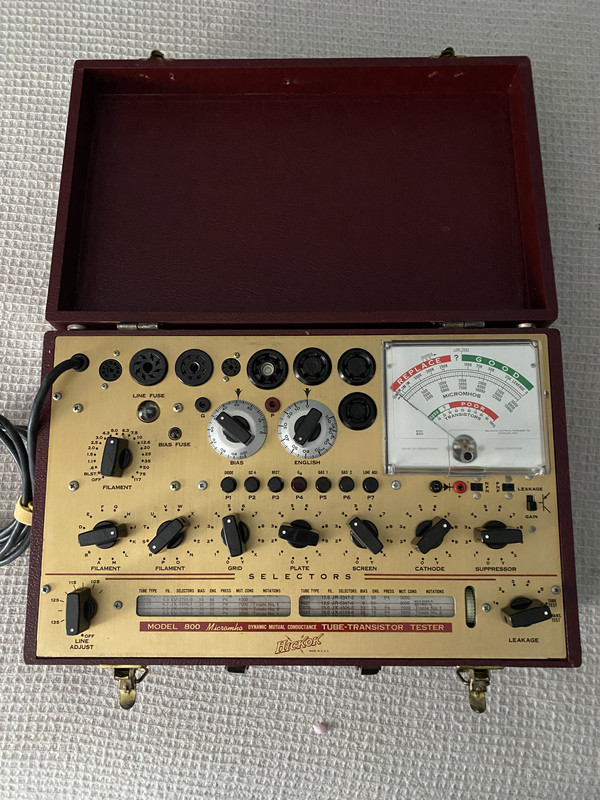
It is rare to find one this nice that works so use caution if looking for one. Best to just buy from vendors with an Amplitrex or similar computerized test equipment.
|
I'm in northern New Jersey if you are local and want to swing by to test your tubes or ship them. No charge
|
Very nice and helpful guys here. If you need replacements they can also help. It's best to have a spare set to plug in while the tubes being tested are away.
|
Build your own. I have schematic, parts list, cad dwg and PCB.
PM for more info.
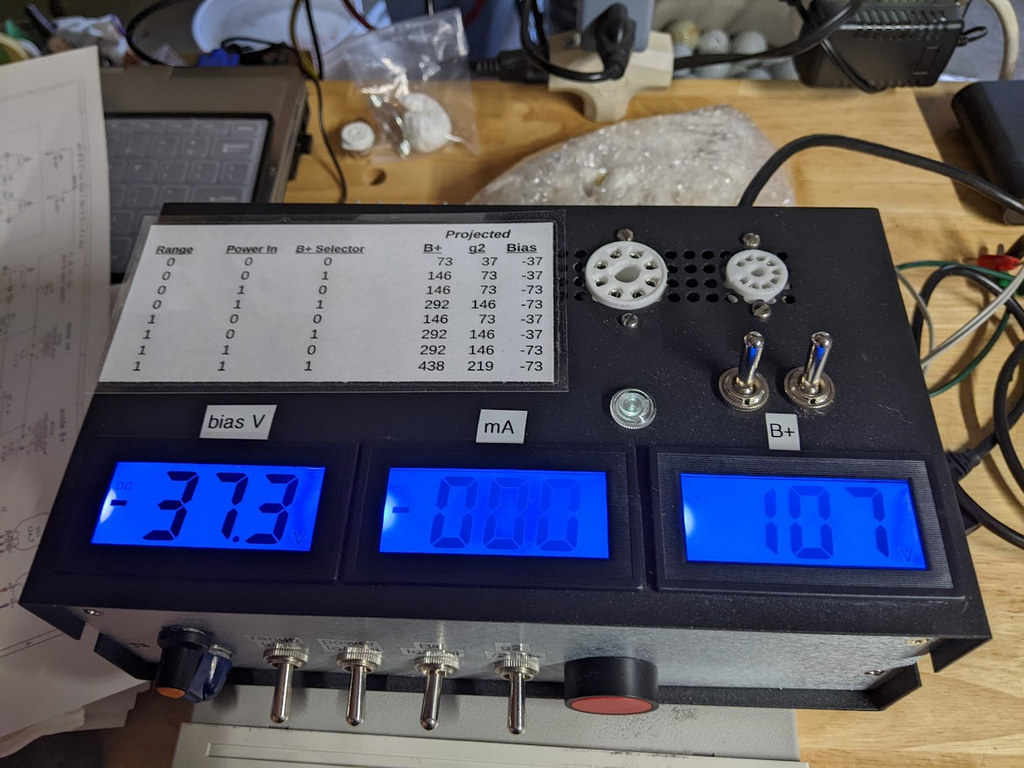
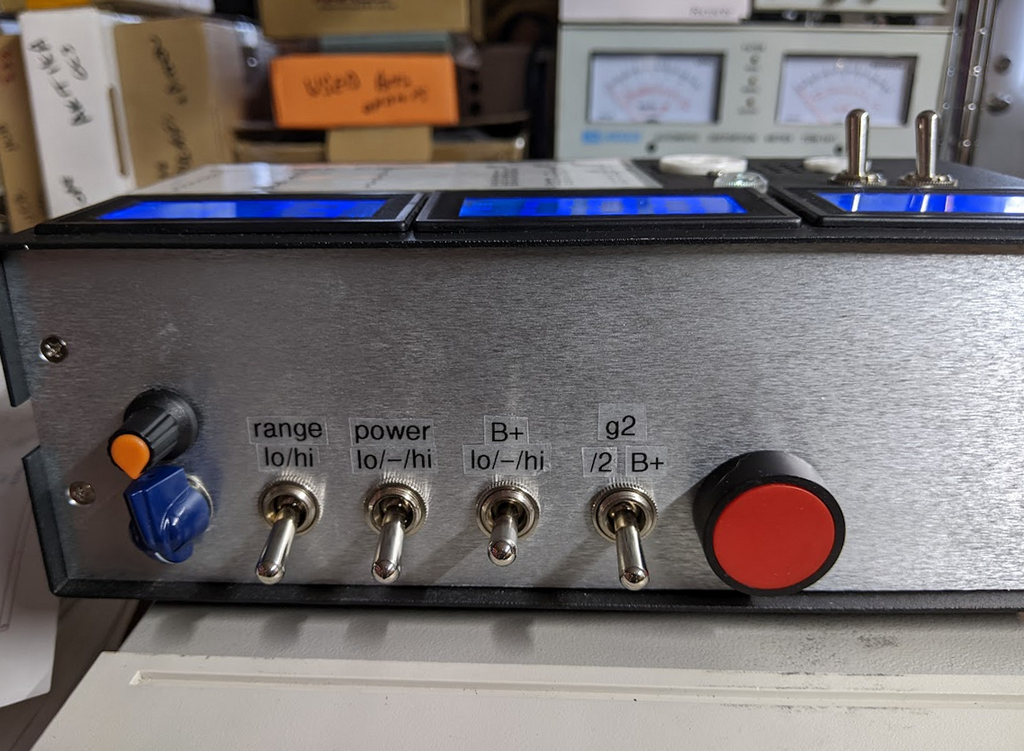
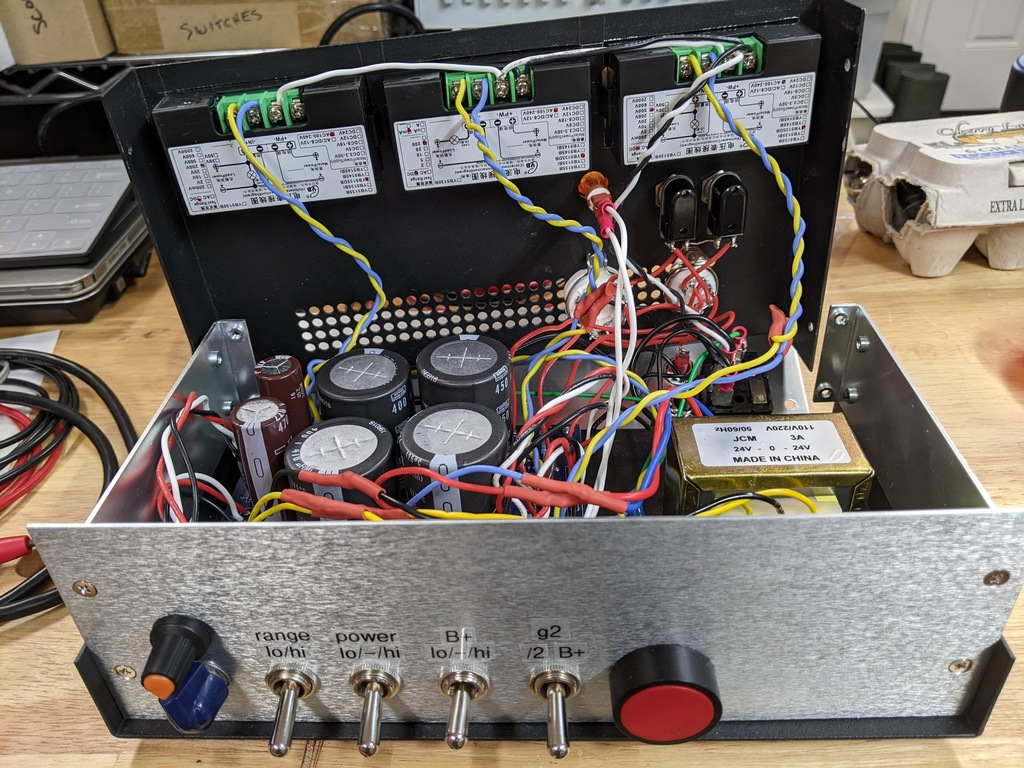
|
@ieales ....*wry S*...
I may be alone, but I see a lot of kismet in those pics...;)
|
I have had tubes since 1973. So my thinking is 'long', many of you don't see it that way.
I read so many questions here from people who have no idea if a problem is something else or a tube or tubes. Asking about tube life, IOW, shooting blind.
The Fisher President II I inherited in 1973 had tubes for it's: am tuner; fm tuner. tape deck, control center; pre-amps; multiplex adapter; phono; added stereo phono preamps.
What an ordeal checking them all just before Thanksgiving each year. I stood on the platform attached to the big wall like tester in the electronics store, separate paper bags for each unit.. People waiting behind me, it took forever, my feet and back hurt, .... each year maybe need 1 or 2 new tubes, 1 weak, 1 a short, ... but it gave me confidence in the unknown!
I always came home in pain saying "I want my own tester". One day the wife picks me up at the train, she drives me to a house, sends me up to the door, a surprise tube tester for my birthday! What a woman!!!!!
I still have the wanted ad she placed in the newspaper taped inside the Accurate 157. She's passed on, it's happy memories every time I open the lid.
I'm just saying, if you get into tubes, rather than shoot blind, get an inexpensive tester, get simple confirmation: short? strength meter, bad or weak (hardly ever), good, how good, matched strength?
It is hard to believe some tubes last 10,000 hours, it is hard to have confidence they don't need to be checked/replaced sooner than needed.
|
If you don't have a nearby dealer with a tube tester, it might be nice to have one of your own. Most of the currently available models test only the most commonly used tubes (particularly tubes used by musicians in guitar amps). My local dealer uses several vintage TV-7 testers and the modern Orange tester. I like the Orange because it is simple to use (you don't have to look up tube data to set the numerous dials and switches that have to be set on the TV-7), and it is pretty stringent in its rating. Tubes that test quite good on the TV-7 often fail on the Orange and the Orange tends to be correct that the tube is failing.
I have an Amplitrex, which is a tester in a different league. It tests at full power so it sort of stress tests a tube, it is simple to use (idiot-proof is a must for me), and it tests a lot of different parameters. If you hook it up to a laptop, it will even curve trace the tube. The big downside is that it is expensive.
The alternative to testing is to have back up tubes that you know are good and fresh. If you swap these in and the sound is dramatically different, you know that at least some of the tubes in your currently operating set are becoming weak. You can then do one-by-one swapping to perhaps identify the culprit; alternatively, you can just change all of the tubes at once and get a new set of reserve tubes.
|
I’ve been ’into’ tubes since the 1950’s w my Dad’s Bogen. I always wanted a tester. Many testers don’t actually test in operation range. I considered the µTrace, but it’s more of an engineer or amp designer than hobbyist’s tool. Hence, the tester shown above.
I have a pal that manufactures tube gear who lives a couple of blocks away. He has a Hickok which showed good on a KT88. Sonically, it clearly wasn't, so dammit, design and build one that can test in actual operation! Results below.

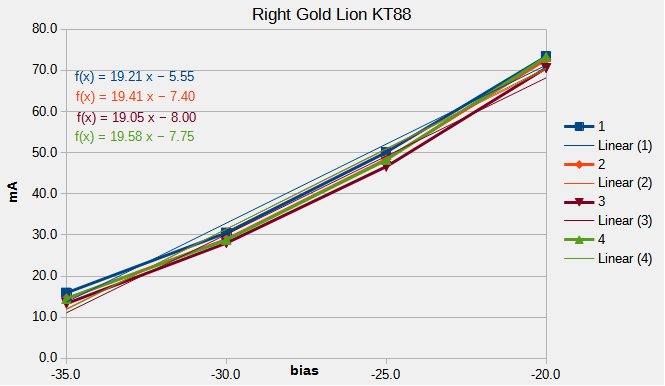
It can easily be modified to include 2x 9 banana plugs and as many sockets as desired to test almost any tube. In 50+ years of tube amp ownership, every tube I’ve owned can be tested in just the two sockets installed.
|
One more issue with older testers: the need for calibration. Older testers have to be occasionally calibrated. There are not that many service people that can properly calibrate an old machine. I know someone who does this. He said that it is a fairly time-consuming process (this translates to expensive).
|
|
While true that most testers don't test at real world voltages it is important to leave the tube in the tester for 5 min or so. If you put it in and test it cold your results will be poor. Ultimately your ears are the final say. That fact that a tube seems to have strong emissions it can still sound poor
|
Depends on how old the tube is and how long it sat on the shelf. Testing NOS that have sat for decades will almost all certainly fail a gas test.
Even new tubes that have sat around for a couple of years may fail the gas test.
Tubes that fail a gas test often recover after 10-20+ continuous hours on the heater. If it doesn't, it likely never will. Some tubes may test gassy after weeks of inaction if they have pin/envelope micro fractures from repeated insertion cycles or 'porous' glass.
As far as sonics, all bets are off. Tubes vary immensely. A particular tube may sound fine in one circuit and not well in another. Additionally one tube may drag down its siblings in a circuit or channel.
AudioPhools lack of evaluation rigor makes most recommendations specious.
|
Good advice from oddiofyl about warming up the tube sufficiently in the tester. I recommended the Orange tester as a reasonably-priced modern alternative, but, someone who uses it at a dealership told me that it does not operate at high power and may give a poor rating to certain types of output tubes (e.g., KT88) unless the test is run several times in quick succession so the tube has warmed up sufficiently.
|
If you are not really experienced with tubes, a tube testers can be a good thing and a bad thing, sure you can weed out shorted tubes that aren’t any good, but you may also be throwing out tubes that are gassy and are not bad. My advice would be to get on the diy tube audio forum and do some research about tubes, tube life, and what are the pros and cons of tube testers.
|
|








